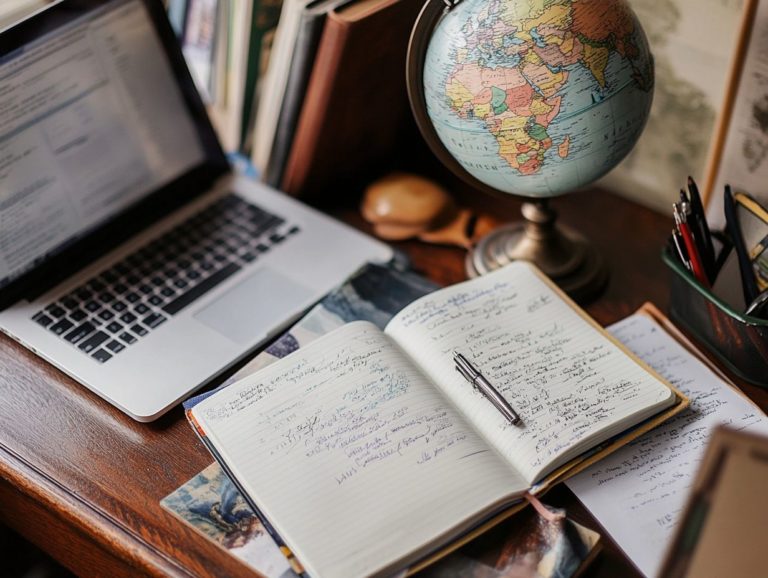How to Prepare for Departure?
Preparing for a departure whether for a new job, an eagerly awaited trip, or a significant life change can feel overwhelming.
Dedicating time to effective planning transforms this transition into a smoother, less stressful experience. This guide outlines essential steps for departure preparation, from crafting a detailed checklist to organizing vital documents and finances.
It also delves into strategies for navigating emotional challenges and finalizing your plans. Doing so helps you land at your destination excited and prepared for the adventure that lies ahead.
Contents
Key Takeaways:

- Understand the importance of preparing for departure and its purpose.
- Create a checklist, organize documents and finances, and secure accommodations and transportation to ensure a smooth departure.
- Prepare emotionally and mentally by coping with stress and setting realistic expectations. Double-check and confirm details, and communicate with others involved to finalize departure plans.
Understanding the Purpose of Departure Preparation
Grasping the significance of departure preparation is crucial for students embarking on a study abroad journey. It profoundly impacts their travel arrangements, financial planning, and emotional well-being.
By concentrating on key elements such as understanding differences in culture, securing health insurance, and getting help from former students who have been there you can navigate the complexities of relocating to a new environment with confidence and ease.
Why is Preparation Important?
Preparation is essential for ensuring a seamless transition when studying abroad. It helps you ease emotional stress and equips you with vital travel tips and supportive resources.
Without sufficient preparation, you might feel overwhelmed by cultural differences, logistical hurdles, and the practicalities of daily life. This is where pre-departure orientation comes into play, offering valuable insights into local customs, essential services, and safety protocols.
Engaging with these resources helps you build a strong support network, become familiar with public transportation, and understand the healthcare system in your new surroundings. This proactive approach enriches your overall experience and enables you to navigate potential challenges, making your journey both rewarding and enjoyable.
Essential Steps for Departure Preparation
Preparing for your departure involves a series of essential steps that ensure every aspect of your travel arrangements is meticulously addressed, from finalizing documentation to securing your student visa and managing your financial planning.
By adhering to a well-structured checklist, you can minimize oversights and prioritize your health and safety, paving the way for a smoother transition abroad.
Creating a Checklist
Creating a final checklist is an essential step in your departure preparation. It ensures you compile all necessary travel documentation and important papers, like your student visa and health insurance policy.
This crucial task will help you dodge last-minute panic! It also allows for a structured method to organize your belongings and paperwork. Begin by categorizing your checklist into specific sections, starting with travel documentation where you can list items such as your passport, tickets, and identification.
Next, focus on packing strategies that detail the right clothing suited for your destination’s climate, along with personal items that are vital for your comfort and convenience. Including essential documents like academic transcripts and emergency contacts tailors your checklist to be comprehensive and personalized, ultimately making your travel experience smoother and more enjoyable.
Organizing Documents and Finances

Organizing your documents and finances is a crucial step in preparing for your departure. It ensures you have all essential paperwork in order, including your student visa and proof of insurance coverage.
Beyond these vital items, prioritize careful financial planning to sidestep unexpected hurdles during your stay. Crafting a comprehensive budget that includes daily living expenses, tuition fees, and travel costs will provide a clearer financial roadmap.
Understanding your insurance coverage options is key to mitigating potential risks and ensuring your peace of mind. Organizing essential documents like bank statements, academic records, and contact information will keep everything easily accessible.
By taking these proactive steps, you can transition smoothly and focus on your educational journey.
Securing Accommodations and Transportation
Securing accommodations and local transportation is an important part of your travel arrangements. This allows you to settle into your new environment seamlessly and ensures a smoother emotional journey.
For many, exploring the diverse array of housing options dormitories, shared apartments, or homestays can enhance your overall experience. Each choice offers unique amenities and social dynamics that cater to your preferences and foster a supportive community.
Arrange reliable local transportation, whether through public transit or cycling options. This is essential for easy access to classes, libraries, and social events. These key elements of university life will nurture your independence and play a vital role in your personal growth and sense of belonging within the new academic landscape.
Preparing Emotionally and Mentally
Preparing emotionally and mentally is as essential as logistical planning when studying abroad. You will face challenges that require effective coping strategies and ways to adjust to new cultures.
By drawing on personal experiences and utilizing supportive resources, you can navigate the emotional landscape that accompanies relocation and adaptation with greater ease.
Coping with Stress and Anxiety
Coping with emotional stress and anxiety is vital as you prepare to study abroad. Various strategies can help manage these feelings and facilitate a smoother transition.
By recognizing the challenges of adapting to a new culture, you can benefit from effective techniques like mindfulness, time management, and physical exercise. Establish a communication plan with family and friends; regular check-ins can provide solace and reassurance during uncertain moments.
Don’t overlook the importance of tapping into supportive resources such as counseling services or local student groups. These can foster community and offer valuable shared experiences, making your journey enjoyable and less overwhelming.
By nurturing these connections and practices, you can navigate your emotional landscape with confidence.
Setting Realistic Expectations
Setting realistic expectations is essential as you embark on your travel experiences. This approach helps you navigate cultural differences and fosters a smoother adjustment to your new community during this emotional journey abroad.
Accept that adaptation takes time and effort. By doing so, you will appreciate the subtleties of your new environment. This adjustment period may involve confronting unfamiliar customs and social norms, which can lead to feelings of isolation or frustration. Be prepared for moments of culture shock and seek solace in connecting with local communities and fellow travelers.
Recognizing your feelings during this journey can significantly enhance your personal growth, making your experience all the more enriching and fulfilling.
Finalizing Departure Plans

Finalizing your departure plans means carefully checking all details of your travel arrangements. It’s essential to ensure that all necessary documents and insurance requirements are in perfect order before the big day arrives.
Establishing a solid communication plan with family and friends can offer valuable support, helping to make your transition smoother as you embark on this new journey.
Double-Checking and Confirming Details
Double-checking and confirming details is an important step in your final preparations, as it ensures that all your travel documentation, insurance coverage, and packing strategies align perfectly with your pre-departure plans.
If you skip this step, you may face stress and complications, like stumbling upon last-minute issues with passports or visas. By organizing and keeping all necessary documents easily accessible, you can significantly enhance your travel experience.
Consider creating a packing list that includes essential items tailored for various climates and activities. This will facilitate a smoother transition upon arrival. By taking the time to review each aspect of your travel arrangements, you can set off on your journey with confidence, fully prepared for whatever awaits you.
Communicating with Others Involved
Communicating with everyone involved in your transition, including family and institutions, is essential for creating a supportive environment as you prepare for your travel experiences.
Talking openly fosters understanding and shared expectations, building a safety net that helps alleviate anxiety during these pivotal moments. Engaging in open conversations with your family can significantly enhance your emotional resilience, while institutions can provide the essential resources and guidance tailored to your individual needs.
This collaborative approach ensures you are well-informed about what lies ahead, enabling you to embrace new opportunities with confidence. By coordinating these communication efforts, everyone becomes an integral player in your journey, paving the way for a smooth transition and enriching travel adventure.
Arriving at Your Destination
Reaching your destination is a pivotal moment in your study abroad journey, signaling the beginning of your adjustment to a lively culture you’ll experience.
Get excited! Explore local transportation options and housing choices that can significantly elevate this experience, making your transition to unfamiliar surroundings much smoother and more enjoyable.
Adjusting and Settling In
Adjusting to a new environment involves carefully navigating cultural differences and finding your footing within the community as you embark on this emotional journey.
While this transition may often feel overwhelming, it presents a wealth of opportunities for personal growth and a deeper understanding of diverse perspectives. One effective strategy for acclimating to a new culture is to engage with local community resources, like cultural centers and student organizations, which foster meaningful interactions with your peers.
By utilizing these supportive networks, you not only get to share your experiences but also cultivate a sense of belonging. Attending workshops or events that celebrate local traditions can significantly enhance your appreciation of your new surroundings. Additionally, seeking mentorship from those who have successfully navigated similar transitions can offer valuable insights and encouragement along the way.
Frequently Asked Questions

How to Prepare for Departure?
Getting ready for departure? It might feel overwhelming, but don’t worry—these tips for preparing for pre-departure orientation will help you get ready in no time.
What should I do before my departure date?
Prior to your departure date, make sure to confirm your flight details, pack all necessary documents, and inform your bank of your travel plans.
How can I ensure that I have everything I need for my trip?
Make a list of all the essential items you need to pack and check it off as you go. This will help you organize and avoid forgetting anything important.
Ready to start your adventure? Let s get packing!
Do I need to get any vaccinations before I leave?
Check with your doctor or a travel clinic to see if any vaccinations are needed for your destination. Some countries require certain vaccinations for entry, so it’s best to be prepared!
What should I do with my home while I’m away?
Arrange for a trusted friend or family member to look after your home. If you’re gone for a long time, remember to pause your mail and newspaper delivery.
How can I make sure I have enough money for my trip?
Create a budget and stick to it. Save money by booking flights and hotels early and choosing budget-friendly activities and meals.




